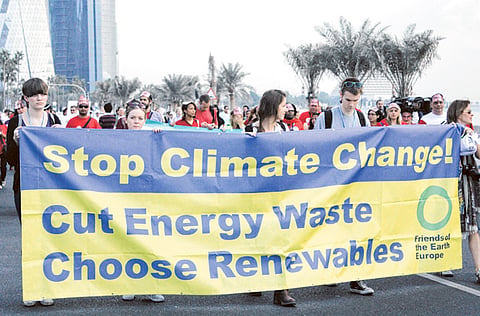‘March for Climate’ demands urgent action
Activists march in Doha during UN climate change conference

Doha, Qatar: Hundreds of activists from around the world and the Arab region participated in a “Climate Public March” early Saturday morning, demanding action at the UN climate talks at COP18 that is taking place in Doha, Qatar from November 26 – December 7.
The UN Climate Change Conference (COP 18) is being held in the Middle East for the very first time.
The march was said to be the first f its kind in the history of modern-day Qatar and had representatives from 15 Arab countries.
Some of the slogans chanted were “Climate Justice Now”, “Less Talk More Action”, “Hot Air not Fair”, “Arab take the Lead” and “Cash for Climate”, among others.
It was supported by regional and international NGO networks such as IndyACT, OASIS Doha, 350.org, Climate Action Network, and the global TckTckTck campaign, as well as youth activists who were instrumental in the Arab spring and are now organised in the newly founded Arab Youth Climate Movement.
Merna Ghaly, 18, Egyptian member of the Arab Youth Climate Movement, who has been attending session at COP18 and was marching, told Gulf News that “so far we haven’t been seeing good results but some promising things from a lot of governments and negotiators, but we have not seen something that is set in stone.”
COP veterans explained that the first days of the convention are usually slow and things get heated in the last few days.
Merna said that she was marching to try to influence the Arab governments and especially the Qatari government, to pledge to reduce their carbon emissions and take the lead in the negotiations.
“This is our future and this is what they are negotiating about, so if the person you are negotiating about tells you what they want that should help you,” she added.
Tasneem Essop, Head of Low Carbon Frameworks Global climate and Energy Initiative at the World Wildlife Fund, South Africa said that they are worried about the discussion as they are not seeing the urgency needed to combat the changes that science and reports indicate being reflected in the negotations. “The political leaders need to know that they have a huge responsibility on their shoulders — that we have a safe climate future.”



